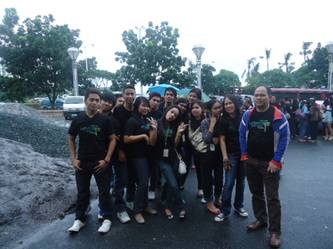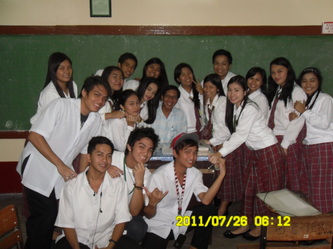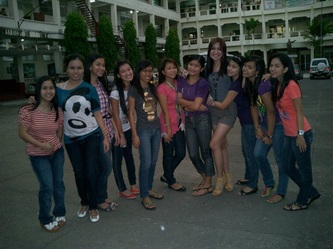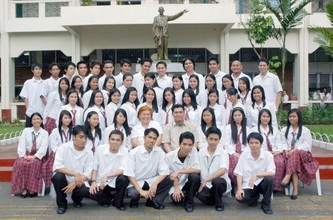SAN PABLO COLLEGES ..
Brief History
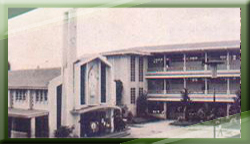
To meet the needs of the growing school-age population of the City of San Pablo and its neighboring towns, a group of pioneering men, among them were Major Ricardo Bonilla, Dr. Antonio Azores, Mr. Ambrosio Alcantara and many others founded and established the San Pablo Colleges in 1947. From its humble beginnings, in makeshift rooms and in rented buildings, the San Pablo Colleges in a brief span of five years acquired a one-half hectare piece of walled lot at Hermanos Belen Street in the heart of the city of San Pablo. Dr. Antonio Azores was its first President. During Dr. Alip's tenure that full government recognition was granted to the Grade School, the Secondary School and the courses in Secretarial, Education, Commerce, Liberal Arts and Law.
However, it was in the middle 50's that the San Pablo Colleges began to build its prestige in becoming one of the notable institutions in the country. This time a comprehensive building program was undertaken. Judge Paulo de Gala Macasaet, considered as the father of this Golden Era of Renaissance, was Chairman of the Board of Trustees and later College President. It was also during his time that the Graduate Institute was recognized and much later the Nursing Course. The objective then was a school that would be second to none.
This quest for educational excellence initiated by Judge Macasaet is now the very goal pursued by his successors. The present leadership has embarked on programs seeking the accreditation of its courses and has been continuously searching how the teaching learning process will not only be effective and efficient but relevant as well.
As everyone knows education is ever growing and there is no end to its progress. Every generation shall have its contribution and for now there is no substitute for the development of the College we all love and revere.
Mission, Vision and Philosophy
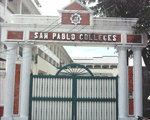
Mission, Vision and Philosophy
Mission
The mission of San Pablo Colleges is the total personality development of the learners geared towards better quality of Filipino life through the acquisition of knowledge, skills and values formation thus, making them productive and active members of society - quality professionals with universal proficiency.
The mission starts in the SPC's Grade School Department, carried over to its Day and Night School Departments, enriched in the undergraduate collegiate programs and strengthened in its Graduate School.
Vision
The center of excellence that develops, harnesses and promotes individuals who critically think, create and act positively for the betterment of the Filipino family, community and the larger society.
Philosophy
The SAN PABLO COLLEGES is an educational institution with a Christian Catholic outlook in its philosophy of education committed to develop, harness and promote the Filipino learners who are:
* Creations of God destined for an eternal life with Him.
* Fully capable into; becoming creative, reflective and critical thinkers committed to serve God, country and fellowmen; and
* Active in realizing their Filipino identity and heritage, moral and spiritual foundation, economic stability, political maturity and equitable social progress.
General Objective
The San Pablo Colleges shall establish and maintain a complete, adequate and integrated system of formal, non-formal and distance mode of education in basic, technical and higher curricular offerings that are relevant to the needs of individuals community and larger society.
Specific Objectives
* Intensify quality, relevant, and excellent instructional programs in all levels of education,
* Inculcate in all levels of student learning the virtues of core values in all phases of instruction, research and extension,
* Strengthen the conduct of research and publication in all levels of education, and
* Promote community extension programs including non-formal and capability building programs.
Mission
The mission of San Pablo Colleges is the total personality development of the learners geared towards better quality of Filipino life through the acquisition of knowledge, skills and values formation thus, making them productive and active members of society - quality professionals with universal proficiency.
The mission starts in the SPC's Grade School Department, carried over to its Day and Night School Departments, enriched in the undergraduate collegiate programs and strengthened in its Graduate School.
Vision
The center of excellence that develops, harnesses and promotes individuals who critically think, create and act positively for the betterment of the Filipino family, community and the larger society.
Philosophy
The SAN PABLO COLLEGES is an educational institution with a Christian Catholic outlook in its philosophy of education committed to develop, harness and promote the Filipino learners who are:
* Creations of God destined for an eternal life with Him.
* Fully capable into; becoming creative, reflective and critical thinkers committed to serve God, country and fellowmen; and
* Active in realizing their Filipino identity and heritage, moral and spiritual foundation, economic stability, political maturity and equitable social progress.
General Objective
The San Pablo Colleges shall establish and maintain a complete, adequate and integrated system of formal, non-formal and distance mode of education in basic, technical and higher curricular offerings that are relevant to the needs of individuals community and larger society.
Specific Objectives
* Intensify quality, relevant, and excellent instructional programs in all levels of education,
* Inculcate in all levels of student learning the virtues of core values in all phases of instruction, research and extension,
* Strengthen the conduct of research and publication in all levels of education, and
* Promote community extension programs including non-formal and capability building programs.
Core Values
RIGHTEOUSNESS
Discipline
As students submit themselves to the chosen discipline or course, they are provided with learning experiences which enrich their Christian values and principles for them to become mature and responsible individuals: with stability of attitude, consistency of commitment, and willingness to share freely with others.
Awareness
Built up maturity and responsibility, students are further encouraged to live ? in the goodness within them: the innate ability to protect their well ? being and promote that of others; the free will to choose between what is right and what is wrong; and the capacity to distinguish what is good from bad to managed and master themselves and change for the better.
Respect
With full awareness on the capacity to love oneself and others, students are invited to exercise the CREDO of RELATIONSHIP with others for them to become channels and/or instruments of LOVE, PEACE, and JOY right in their home and other institutions.
Excellence
Clothed with discipline, awareness, and respect, the students are led step to make an effort to profess the word of wisdom and the word of God, ?Be perfect just as your Father in heaven is perfect?. Grow toward perfection is the seal of ?Dare to be different.?
SERVICE
Word of God
Imbued with the Christian Catholic philosophy of education, students are on the value of the word of God, Matthew 4:4- Man cannot live on bread alone, but needs every word that Gods speaks. Gradually, they are to apply what they learned to put order, reflection and direction in their daily living.
Work
Enlightened and inspired by the word of God, students perform their work as WORSHIP to God: doing their best to please God and serve mankind.
Witness
Spirit ? filled and empowered to lead by example, students are commissioned to go forth, to love and serve the Good Lord. Above all, to be the best and light of the earth. (Matthew 5:13 ? 16) The SPC Core Values area made tangible through infusion in its three ? pronged function: Research, Instruction, and Extension Service and in Spiritual Activities.
CREDO
For My Relationship
You and I are in a relationship that I value and want to keep.
Yet each of us is separate person with his own unique needs and the right to try to meet those needs.
I will try to be genuinely accepting of your behavior when you are trying to meet your needs or when you are having problems meeting your needs. When your share your problems, I will try to listen acceptingly and understandingly a way that will facilitate your finding your own solutions rather than depending upon mine.
When you have a problem because my behavior is interfering with your meeting need, I encourage you to tell me openly and honestly how you are feeling.
At those times, I will listen and then try to modify my behavior, if I can.
However, when your behavior interferes with my meeting my own needs, thus causing me to feel unaccepting of you, I will share my problem with you and tell you as openly as I can exactly how I am feeling, trusting that you respect my needs enough to listen and then try to modify your behavior.
At those times when either of us cannot modify his behavior to meet the needs of the other and find that we have a conflict of needs in our relationship, let us commit ourselves to resolve each such conflict without ever resorting to the use of either my power or yours, to win at the expenses of the other losing.
I respect your needs, but I also must respect my own,.
Consequently, let us strive always to search for solutions to our inevitable conflicts that will be acceptable to both of us. In this way, your needs will be met, but so will mine ? no one will lose, both will win. As a result, you can continue to develop as a person through meeting your needs, but so can I.
Our relationship thus can always be a healthy one because it will be mutually satisfying.
Each of us can become what he is capable of being, and we can continue to relate to each other with feelings of mutual respect and love, in friendship and in peace.
- Dr. Thomas Gordon
The end product of the SPC educational program is a transformed graduate with the:
SENSE OF HUMANISM AND NATIONHOOD SPIRITUAL AND MORAL STRENGTH PROFESSIONAL COMPETENCY ACCOUNTABILITY AND SOCIAL RESPONSIBILITY.
RIGHTEOUSNESS
Discipline
As students submit themselves to the chosen discipline or course, they are provided with learning experiences which enrich their Christian values and principles for them to become mature and responsible individuals: with stability of attitude, consistency of commitment, and willingness to share freely with others.
Awareness
Built up maturity and responsibility, students are further encouraged to live ? in the goodness within them: the innate ability to protect their well ? being and promote that of others; the free will to choose between what is right and what is wrong; and the capacity to distinguish what is good from bad to managed and master themselves and change for the better.
Respect
With full awareness on the capacity to love oneself and others, students are invited to exercise the CREDO of RELATIONSHIP with others for them to become channels and/or instruments of LOVE, PEACE, and JOY right in their home and other institutions.
Excellence
Clothed with discipline, awareness, and respect, the students are led step to make an effort to profess the word of wisdom and the word of God, ?Be perfect just as your Father in heaven is perfect?. Grow toward perfection is the seal of ?Dare to be different.?
SERVICE
Word of God
Imbued with the Christian Catholic philosophy of education, students are on the value of the word of God, Matthew 4:4- Man cannot live on bread alone, but needs every word that Gods speaks. Gradually, they are to apply what they learned to put order, reflection and direction in their daily living.
Work
Enlightened and inspired by the word of God, students perform their work as WORSHIP to God: doing their best to please God and serve mankind.
Witness
Spirit ? filled and empowered to lead by example, students are commissioned to go forth, to love and serve the Good Lord. Above all, to be the best and light of the earth. (Matthew 5:13 ? 16) The SPC Core Values area made tangible through infusion in its three ? pronged function: Research, Instruction, and Extension Service and in Spiritual Activities.
CREDO
For My Relationship
You and I are in a relationship that I value and want to keep.
Yet each of us is separate person with his own unique needs and the right to try to meet those needs.
I will try to be genuinely accepting of your behavior when you are trying to meet your needs or when you are having problems meeting your needs. When your share your problems, I will try to listen acceptingly and understandingly a way that will facilitate your finding your own solutions rather than depending upon mine.
When you have a problem because my behavior is interfering with your meeting need, I encourage you to tell me openly and honestly how you are feeling.
At those times, I will listen and then try to modify my behavior, if I can.
However, when your behavior interferes with my meeting my own needs, thus causing me to feel unaccepting of you, I will share my problem with you and tell you as openly as I can exactly how I am feeling, trusting that you respect my needs enough to listen and then try to modify your behavior.
At those times when either of us cannot modify his behavior to meet the needs of the other and find that we have a conflict of needs in our relationship, let us commit ourselves to resolve each such conflict without ever resorting to the use of either my power or yours, to win at the expenses of the other losing.
I respect your needs, but I also must respect my own,.
Consequently, let us strive always to search for solutions to our inevitable conflicts that will be acceptable to both of us. In this way, your needs will be met, but so will mine ? no one will lose, both will win. As a result, you can continue to develop as a person through meeting your needs, but so can I.
Our relationship thus can always be a healthy one because it will be mutually satisfying.
Each of us can become what he is capable of being, and we can continue to relate to each other with feelings of mutual respect and love, in friendship and in peace.
- Dr. Thomas Gordon
The end product of the SPC educational program is a transformed graduate with the:
SENSE OF HUMANISM AND NATIONHOOD SPIRITUAL AND MORAL STRENGTH PROFESSIONAL COMPETENCY ACCOUNTABILITY AND SOCIAL RESPONSIBILITY.
